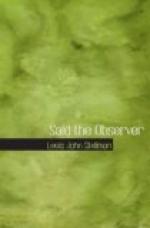A WONDERFUL MACHINE.
“I see by one of the papers that a Chinaman has invented a typewriter which writes in the Celestial language,” said the Observer, handing the bootblack a nickel and shaking hands with the crowd. “This bright Oriental, who is known as Tap-Key, has undertaken a very large contract, for the Chinese language, as most people know, is composed entirely of word symbols, each of which represents a word; some combining to form other words, as for instance, a square represents a field, and a combination of ‘man’ and ‘field’ signifies a farmer; while ‘a man in a box’ most graphically describes a prisoner, and ’two women’ typify ‘gossip,’ which is emphasized by adding another of the fair sex, so that a half-dozen women in a row would probably mean the direst kind of mischief.
[Illustration: Chinese typewriter]
“Well, to embrace any kind of a vocabulary, this machine would need to have about 5,000 characters, and would require quite a force of men to operate it, but the advantages which would accrue from its use are almost inestimable. The Spaniards have found in the typewriter a most effective instrument of war, and through its use many of Weyler’s most important battles were won. Reports from South Africa seem to indicate that it has played no unimportant role in England’s subjugation of the Boers, and General Elwell S. Otis has even been accused of employing it with terrible effect against the forces of Aguinaldo. With such an awful weapon as Tap-Key has invented the Chinese government might defy the allied powers with impunity and even regain the territory captured by Japan. The young Emperor could doubtless put to flight the august but doughty dowager, as well as his beloved relative, Prince Tuan, and rule his flowery kingdom in peace and harmony, while Li Hung Chang would lose his head, metaphorically, if not literally, in favor of Tap-Key, future lord of the war department.”
DRAWBACKS OF THE KING BUSINESS.
“No,” said the Observer, thoughtfully, “I never cherished dreams of inordinate wealth or power; there’s nothing in it. If a man is satisfied to reach a moderate altitude he may enjoy it unmolested, but if he succeeds in scaling some remarkable height, there immediately arises an army of envious cranks ready to take his life or make it so miserable for him that he will be glad to sell out at half price and gratefully descend into the obscurity from which he rose.
“Nor, is it only the self-made man to whom these remarks apply. Take, for example, the Czar of Russia, the Emperor of Germany, or any other potentate, Christian or heathen, civilized or savage, great or small. He has more trouble to the square inch than a weather prophet. Nicholas III is probably the worst off of them all. He gets up early in the morning and shaves himself with a safety razor, while the court chemist is analyzing his breakfast for traces of arsenic or prussic acid; then he dons his bullet-proof coat, descends a private stairway to a bomb-proof drawing-room and receives his meals on a dumb-waiter from the laboratory with the chemist’s certificate that all injurious substances have been removed.




